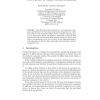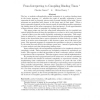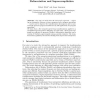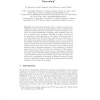143 search results - page 6 / 29 » Abstract Interpretation and Partial Evaluation in Functional... |
ASIAN
1998
Springer
13 years 11 months ago
1998
Springer
Abstract. Type-directed partial evaluation is a new approach to program specialization for functional programming languages. Its merits with respect to the traditional offline part...
ESOP
1990
Springer
13 years 10 months ago
1990
Springer
The key to realistic self-applicable partial evaluation is to analyze binding times in the source program, i.e., whether the result of partially evaluating a source expression is ...
SAS
1994
Springer
13 years 10 months ago
1994
Springer
Abstract. Our aim is to study how the interpretive approach -- inserting an interpreter between a source program and a program specializer -- can be used to improve the transformat...
TOPLAS
2008
13 years 6 months ago
2008
act Interpretation C. BERNARDESCHI, N. DE FRANCESCO, G. LETTIERI, L. MARTINI, and P. MASCI Universit`a di Pisa Bytecode verification is a key point in the security chain of the Jav...
AGP
1997
IEEE
13 years 11 months ago
1997
IEEE
Abstract. Functional logic languages with a complete operational semantics are based on narrowing, a generalization of term rewriting where unification replaces matching. In this ...




